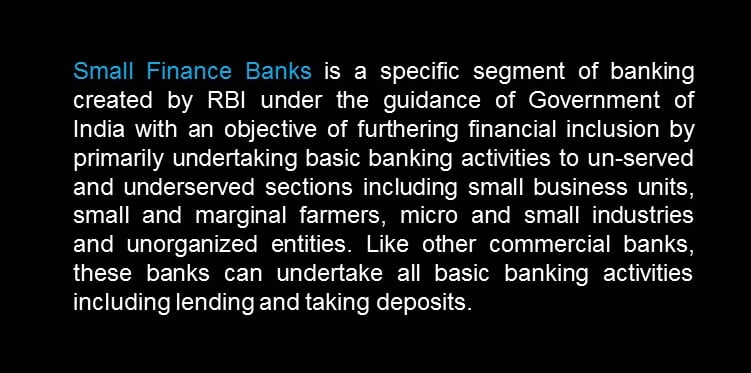Small Finance Bank
Context:
Recently, the Reserve Bank of India (RBI) has received applications from two more entities under the “on-tap” small finance bank licensing guidelines of 2019.
- An “on-tap” facility would mean the RBI will accept applications and grant licences for banks throughout the year.
About Small Finance Banks (SFBs)
Small finance banks are a type of niche banks common in India. These small finance banks with the approved licences can provide basic banking services such as acceptance of deposits and lending to those sections of the Indian economy not serviced by mainstream nationalised banks. These sections include small business units, small and marginal farmers, micro and small industries and unorganised sector entities.
A brief summary of the regulations involving SFBs are highlighted below:
- Existing non-banking financial companies (NBFC), microfinance institutions (MFI) and local area banks (LAB) can apply to become small finance banks.
- They can be promoted either by individuals, corporate, trusts or societies.
- They are established as public limited companies in the private sector under the Companies Act, 2013.
- They are governed by the provisions of Reserve Bank of India Act, 1934, Banking Regulation Act, 1949 and other relevant statutes.
- The banks will not be restricted to any region.
- They were set up with the twin objectives of providing an institutional mechanism for promoting rural and semi-urban savings and for providing credit for viable economic activities in the local areas.
- The promoters should have 10 years’ experience in banking and finance. The promoters stake in the paid-up equity capital will be at least 40% initially but must be brought down to 26% in 12 years. Joint ventures are not permitted. The foreign shareholding will be allowed in these banks as per the rules for Foreign Direct Investment (FDI) in private banks in India.
- At a net worth of ₹500 crores, the listing will be mandatory within three years. Small finance banks having a net worth of below ₹500 crores could also get their shares listed voluntarily.
Eligibility for Setting up SFBs:
- Resident individuals/professionals with 10 years of experience in banking and finance.
- The companies and societies owned and controlled by residents.
- Existing Non-Banking Finance Companies (NBFCs), Micro Finance Institutions (MFIs), Local Area Banks (LABs) and payment banks that are owned and controlled by residents.
Activities:
- Primarily undertake basic banking activities of acceptance of deposits and lending to unserved and underserved sections including small business units, small and marginal farmers, micro and small industries and unorganised sector entities.
- Undertake other non-risk sharing simple financial services activities such as the distribution of mutual fund units, insurance products, pension products, etc. with the prior approval of the RBI.
Regulations:
- SFBs are governed by the provisions of the:
- Reserve Bank of India Act, 1934;
- Banking Regulation Act, 1949;
- Foreign Exchange Management Act, 1999;
- Payment and Settlement Systems Act, 2007;
- Credit Information Companies (Regulation) Act, 2005;
- Deposit Insurance and Credit Guarantee Corporation Act, 1961;
- Other relevant Statutes and the Directives issued by the Reserve Bank of India (RBI) and other regulators from time to time.
Guidelines for ‘on-tap’ Licencing:
- Capital Requirement: The minimum paid-up voting equity capital / net worth requirement shall be Rs. 200 crores.
- For Primary (Urban) Co-operative Banks (UCBs), desirous of voluntarily transiting into SFBs, initial requirement of net worth shall be at Rs. 100 crores, which will have to be increased to Rs. 200 crores within 5 years from the date of commencement of business.
- Scheduled Bank status to SFBs: SFBs will be given scheduled bank status immediately upon commencement of operations.
- Payments Banks Conversion to SFBs: The payment banks can apply for conversion into SFB after 5 years of operations if they are otherwise eligible as per these guidelines.
Scheduled Banks
- Scheduled banks are banks that are listed in the 2nd schedule of the Reserve Bank of India Act, 1934.
- The bank’s paid-up capital and raised funds must be at least Rs. 5 lakh to qualify as a scheduled bank.
- Scheduled banks are liable for low-interest loans from the Reserve Bank of India and membership in clearinghouses.
- All commercial banks, including nationalized, international, cooperative, and regional rural banks, fall under scheduled banks.
Source: The Hindu
You can find many articles on ECONOMY (part of GS III) in our website. Go through these articles share with your friends and post your views in comment section.

